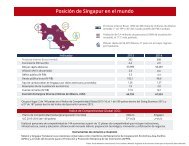- Page 1 and 2:
A BASIC GUIDE TOEXPORTINGThe Offici
- Page 3:
export.gov/basicguideLibrary of Con
- Page 6 and 7:
Table of ContentsChapter 1: Introdu
- Page 8:
global GDP and 30 percent of global
- Page 11:
A GEE might consist, for example, o
- Page 14 and 15:
Success StoryPedaling Through Trial
- Page 16 and 17:
Chapter 2Developing anExport Strate
- Page 18 and 19:
specified in the EAR under a specif
- Page 20 and 21:
All U.S. businesses have many ways
- Page 23 and 24:
Answer these 11 questions:1. Which
- Page 25 and 26:
Product or Service• What need doe
- Page 27 and 28:
Sample Outline of anExport PlanTabl
- Page 29 and 30:
5. Current Trends and Practices•
- Page 31 and 32:
16. My Product’s Harmonized Code
- Page 33:
Success StoryDownloading NewInterna
- Page 36 and 37:
This last advantage is especially i
- Page 38 and 39:
Gathering and evaluating secondary
- Page 40 and 41: Drawing ConclusionsAfter analyzing
- Page 42 and 43: United Nations Statistical Yearbook
- Page 44 and 45: Private-Sector Product and Industry
- Page 46 and 47: Success StoryHelping Feed the World
- Page 48 and 49: Chapter 4Export AdviceIn this chapt
- Page 50 and 51: Some of the more important services
- Page 52 and 53: the important difference that the b
- Page 54 and 55: at no cost to the small business ex
- Page 56 and 57: A commercial bank can perform many
- Page 58 and 59: location and construction of manufa
- Page 60 and 61: To prevent reverse engineering in C
- Page 62 and 63: We are agnostic on the question of
- Page 64 and 65: Distribution ConsiderationsHere are
- Page 66 and 67: Often, the first company does not p
- Page 68 and 69: your ability to terminate agreement
- Page 70 and 71: Once your company has prequalified
- Page 72 and 73: Choosing a ForeignRepresentative or
- Page 74 and 75: Success StoryDon’t Wait—Innovat
- Page 76 and 77: Chapter 6Finding QualifiedBuyersIn
- Page 78 and 79: companies are available from many p
- Page 80 and 81: Trade Fair Certification Program (e
- Page 82 and 83: Millennium Development CorporationT
- Page 84 and 85: Who Is the “Ideal”International
- Page 86 and 87: Scores of new franchising concepts
- Page 88 and 89: Success StoryCast a Wide Net to Cat
- Page 92 and 93: You can also contact the Office of
- Page 94 and 95: training seminars, or DVDs. Zeigler
- Page 96 and 97: The ChallengeSmith first looked tow
- Page 98 and 99: encompasses services in transportat
- Page 100 and 101: give U.S. companies a competitive e
- Page 102 and 103: Success StoryRecruiting New Franchi
- Page 104 and 105: Chapter 10International LegalConsid
- Page 106 and 107: For more information from the U.S.
- Page 108 and 109: When goods enter a bonded warehouse
- Page 110 and 111: under the UCC. Older works may also
- Page 112 and 113: Trade names are also protected on a
- Page 114 and 115: knowledge, in turn, promotes furthe
- Page 116 and 117: prevent him or her from obtaining a
- Page 118 and 119: Business-to-Consumer E-Commerce Wor
- Page 120 and 121: Because such a website is often sta
- Page 122 and 123: An online exporter may choose to pu
- Page 124 and 125: important to identify and incorpora
- Page 126 and 127: other business contacts) options re
- Page 128 and 129: Success StoryGrowing Strong withInt
- Page 130 and 131: Chapter 12Shipping YourProductIn th
- Page 132 and 133: One popular method of shipment is t
- Page 134 and 135: Certificate of ConformityRequired b
- Page 136 and 137: The cost of the shipment, delivery
- Page 138 and 139: To learn more about comprehensive r
- Page 140 and 141:
China but needed to do a lot of hom
- Page 142 and 143:
price is too high, the product or s
- Page 144 and 145:
CompetitionIn the domestic market,
- Page 146 and 147:
Commonly Used TermsIt is important
- Page 148 and 149:
Success StoryAligning Innovationwit
- Page 150 and 151:
Chapter 14Methods ofPaymentIn this
- Page 152 and 153:
Letters of Credit and Documentary C
- Page 154 and 155:
You must provide documentation show
- Page 156 and 157:
associated with open-account trade
- Page 158 and 159:
payment. This is because the export
- Page 160 and 161:
ut they were willing to make the sm
- Page 162 and 163:
• The need for preshipment financ
- Page 164 and 165:
Thus it is in your best interest to
- Page 166 and 167:
to support ongoing export sales or
- Page 168 and 169:
To be eligible, a business must hav
- Page 170 and 171:
Medium Enterprise Department and OP
- Page 172 and 173:
Success StoryManufacturingInternati
- Page 174 and 175:
Chapter 16Business TravelAbroadIn t
- Page 176 and 177:
Planning an ItineraryTravel agents
- Page 178 and 179:
Business Culture TipsAlways answer
- Page 180 and 181:
Gift giving is an important part of
- Page 182 and 183:
particularly intense issue. So the
- Page 184 and 185:
Here are a few suggestions.• Expe
- Page 186 and 187:
Building a Working RelationshipOnce
- Page 188 and 189:
negotiations and agreements with it
- Page 190 and 191:
Chapter 18Rules of Originfor FTAsIn
- Page 192 and 193:
5. Determine if the foreign content
- Page 194 and 195:
The original ROOs are listed in an
- Page 196 and 197:
Example Rules of OriginCombining Mu
- Page 198 and 199:
Israel, Jordan, Morocco, Bahrain, a
- Page 200 and 201:
The importer may ask the exporter w
- Page 202 and 203:
Generic CertificatesIf a good does
- Page 204 and 205:
Architectural Association of Kenya
- Page 206 and 207:
Appendix A: Glossary of TermsAdvanc
- Page 208 and 209:
Export-Import Bank of the United St
- Page 210 and 211:
Market SurveyReport that provides a
- Page 212 and 213:
Appendix B: Definitions of Abbrevia
- Page 214 and 215:
Appendix D: FormsHere, you will fin
- Page 216 and 217:
228U.S. Commercial Service • A Ba
- Page 218 and 219:
Tech International1000 J Street, N.
- Page 220 and 221:
COMMERCIAL INVOICESELLER: INVOICE N
- Page 222 and 223:
Copyright © 1998 UNZ & CO.SHIPPER/
- Page 224 and 225:
DEPARTMENT OF HOMELAND SECURITYU.S.
- Page 226 and 227:
PACKING LIST© Copyright 2001 Unz &
- Page 228 and 229:
1a. U.S. PRINCIPAL PARTY IN INTERES
- Page 230 and 231:
U.S. $13220of this FIRST of Exchang
- Page 232 and 233:
IndexAA2ASee account-to-account (A2
- Page 234 and 235:
Global Entrepreneurship Ecosystem (
- Page 236 and 237:
Swinko, RonSee Jet IncorporatedSzuc
- Page 238 and 239:
International OfficesAfghanistanKab





